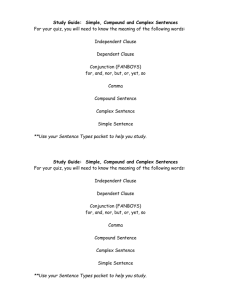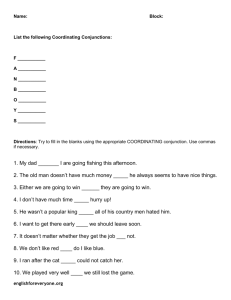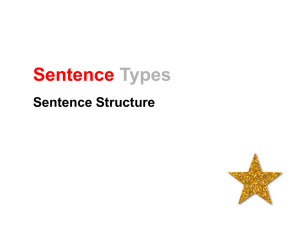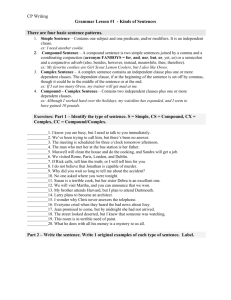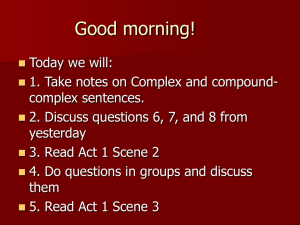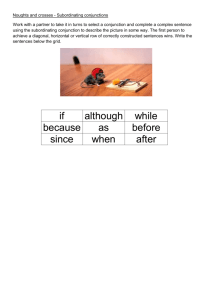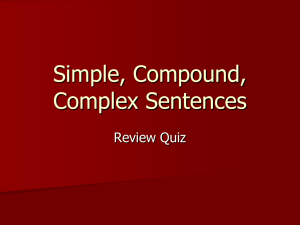File - SEC.3 INTERMEDIATE ENGLISH
advertisement
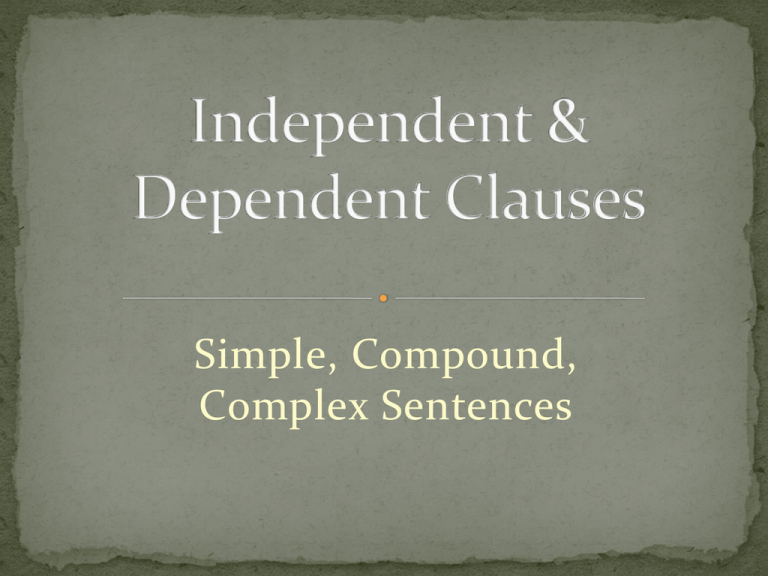
Simple, Compound, Complex Sentences Independent clauses CAN STAND ON THEIR OWN. They are complete sentences on their own! They lived on the Computers are tiny island Our friends were extremely terrified Their car was demolished wonderful tools The calendar needs to be updated Dependent clauses do not make sense if they stand alone. They begin with a subordinating conjunction (if, so, when, after, because, before, while, until, since, etc.) Dependent clauses CANNOT STAND ALONE. They require HELP!!! Since she was late to While we are school today Until we win the big game After she travels to Europe speeding down the interstate When I go to my old elementary school If you like anchovies on your pizza Sentences A simple sentence consists of one independent clause. An independent clause contains a subject and a predicate and expresses a complete thought. During the game, Jasmine scored 23 points, had 6 assists, 8 rebounds, and 2 blocked shots. Tim is a really good pitcher and hitter. A compound sentence consists of two or more independent clauses that are connected by a comma and a coordinating conjunction (for, and, nor, but, or, yet, so)—or a semicolon instead of FANBOYS I like to be very active in my life, and my favorite sports are football, basketball, baseball, soccer, and hockey. Compound sentences are formed when two independent clauses are joined with a comma and a conjunction (for, and, nor, but, or, yet, or so) The two dogs barked at us viciously, so we quickly rode away from them! Complex sentences are formed when one dependent clause and one independent clause are joined. When I watch a football game, I get very loud sometimes. I get very loud sometimes when I watch a football game. A complex sentence consists of an independent clause and one or more dependent clauses. Using a subordinating conjunction (because, although, even though, after, because, if, etc.) creates a dependent clause. Using a relative pronoun (who, whom, that, or which) creates a dependent clause. I would really love my English class if we didn’t have to do so much writing. These also consist of more than one clause: a dependent and an independent. The key is to find the subordinating conjunction in the sentence which is either at the beginning with a comma in the middle of the sentence before the independent clause, or in the middle with no comma and an independent clause at the beginning of the complex sentence. After, although, as, as far as, as if, as long as, as soon as, as though Because, before, besides Even though, even if, ever since If, in order that Since, so that Than, that, though Unless, upon, until When, whenever, where, wherever, whether, while ABE IS TUW SIMPLE: INDEPENDENT COMPOUND: INDEP + INDEP (AND, BUT, FOR, NOR, OR, SO, YET) COMPLEX: INDEP + DEP (AFTER, ALTHOUGH, EVEN THOUGH, BECAUSE, WHEN, THAT, WHICH, WHO, WHOM) Ever since I started the 7th grade at Granite Oaks Middle School, I have changed so much as a person. It is a Complex sentence because “ever since” serves as a subordinating conjunction that connects the introductory dependent clause to the independent clause. I like pizza, chicken wings, and cheerleaders very much! It is a Simple sentence because even though it has the coordinating conjunction “and” in it, there is not a complete sentence after the word “and.” I don’t know why people sometimes run into poles, but those who do so are really embarrassed. It is a Compound sentence because the coordinating conjunction “but” connects two independent clauses. I would love to give everyone an A for all their work; however, it would take everyone to do all of their work and their best work. It is a compound sentence because the semicolon “;” connects the two independent clauses. I especially like Mr. Victor’s class after we get to leave his room. It is a Complex sentence because the subordinating conjunction in the middle of the sentence “after” joins the dependent clause with the introductory independent clause. I would like to play football, basketball, baseball, softball, soccer, or just about any other sport as well. It is a Simple sentence because even though it has commas in it, the items are just a list. Plus, even though it has a FANBOYS in it, what follows the “or” is not a complete sentence.
